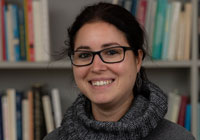
Photo credits:
Danish Saroee
Francesca Rosignoli
Junior Global Horizons Fellow, SCAS.
Postdoctoral Fellow, Department of Political Science, Stockholm University.
Project Leader and Researcher, Institute for Comparative Federalism, Eurac Research, Bolzano
Francesca Rosignoli got her PhD in Public, Comparative and International Law at the Sapienza
Università di Roma in 2016. After working as an environmental consultant, she held a postdoctoral
fellowship at Stockholm University (2019–21).
As a Postdoctoral Fellow, Rosignoli expanded her
knowledge of the recognition of climate refugees’ rights in the light of environmental justice. She
was a key member of the project “Environmental Research in the Human Sciences Area”, which
worked to create an interdisciplinary dialogue between social sciences and environmental humanities.
In 2019, Rosignoli founded the first female-only research group focusing on Environmental Justice
(EJ) in Italy. The group has created a network called EJ-Italy. Rosignoli coordinates this group and
manages its newsletter, sharing useful information on conferences, papers, calls for papers, job posi-
tions, and webinars on EJ. Rosignoli is also co-editing a Special Issue of the Socioscapes. International
Journal of Societies, Politics and Cultures, called “Racism, Environment and Health” (forthcoming).
Her most significant publications are “Environmental Justice in Italy” (Partecipazione e Conflitto, 2017),
“Categorizing Collective Capabilities” (Partecipazione e Conflitto, 2018), “Promozione della giustizia am-
bientale nei siti industriali contaminati” [Environmental justice promotion in industrially contaminated
sites] (Epidemiologia & Prevenzione, 2020), and the monograph Giustizia Ambientale [Environmental
Justice] (Castelvecchi, 2020). She also has a promising monograph entitled Environmental Justice for
Climate Refugees under contract with Routledge.
During her time at SCAS, Rosignoli will be advancing her research agenda on climate-induced migration.
Her focus points include if and how climate-induced migration is managed by selected European institu-
tions (the EU Parliament, the EU Commission, and the European Council), whether the gender dimension
is taken into account, and which strategies are envisioned to deal with this issue.
This information is accurate as of the academic year 2021-22.






